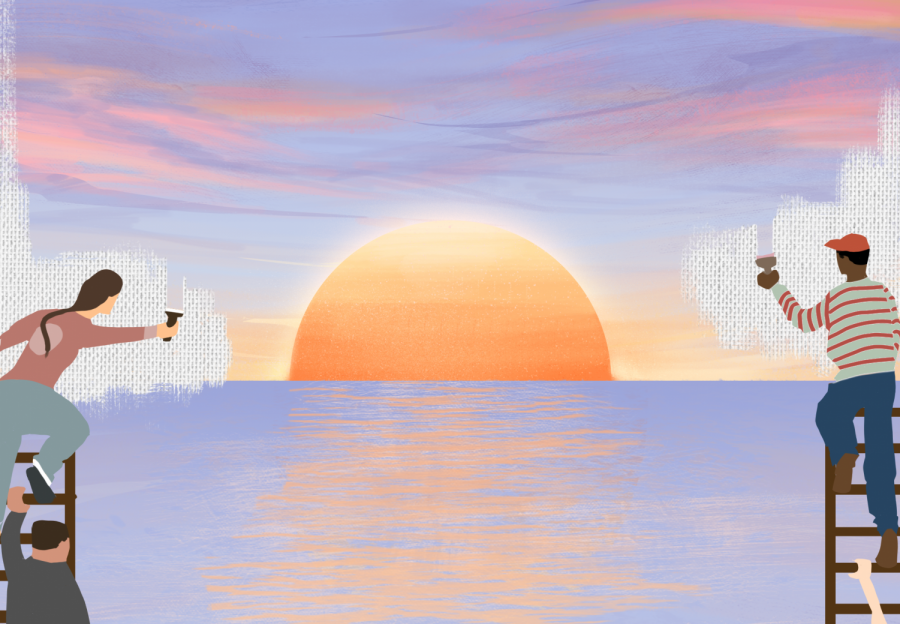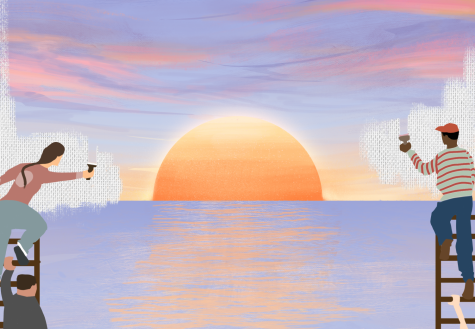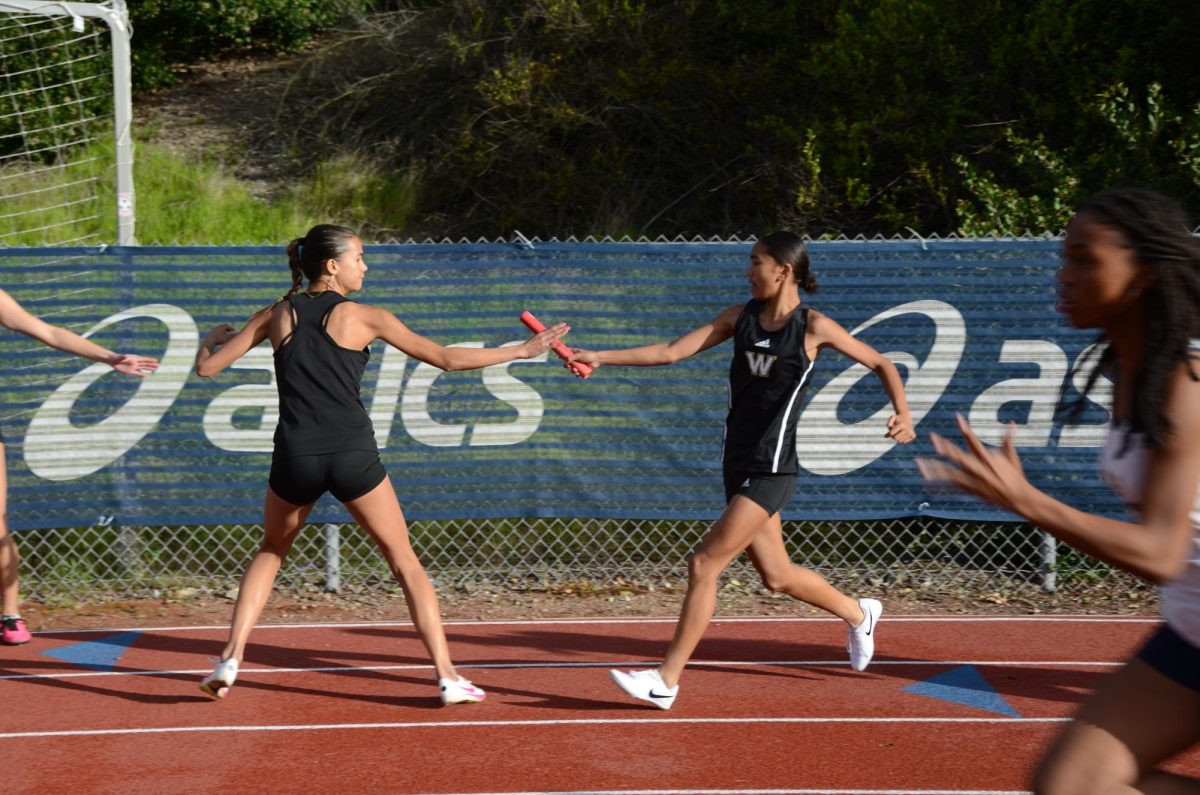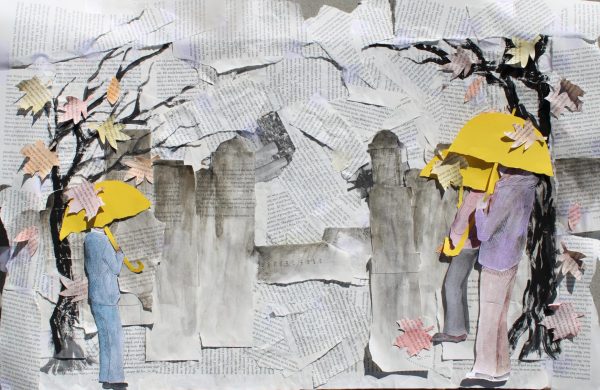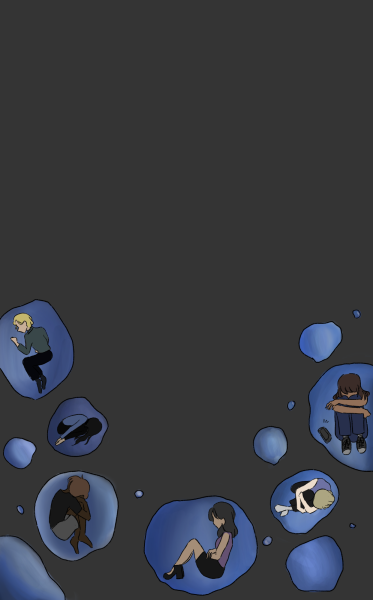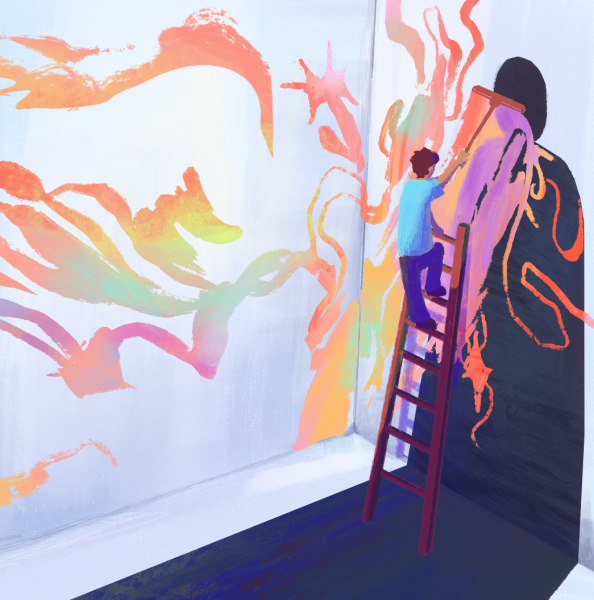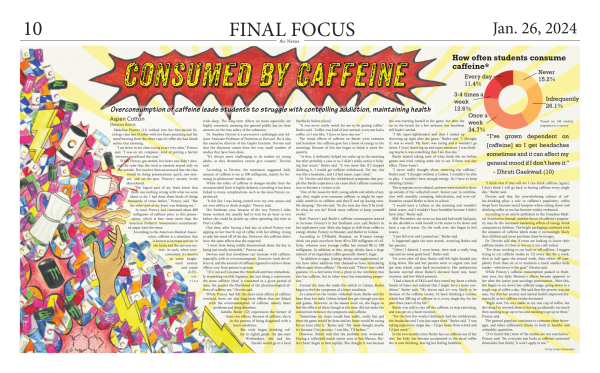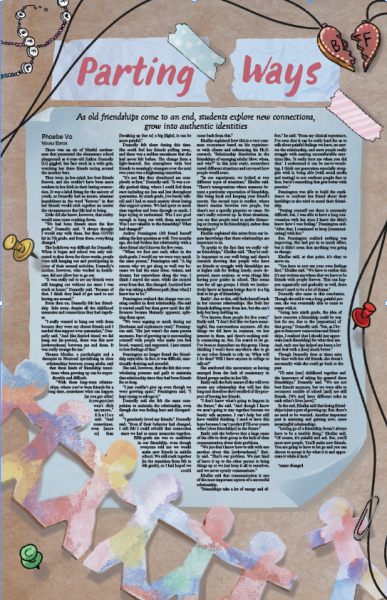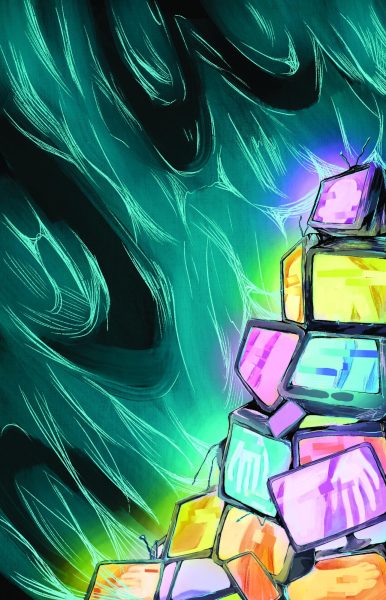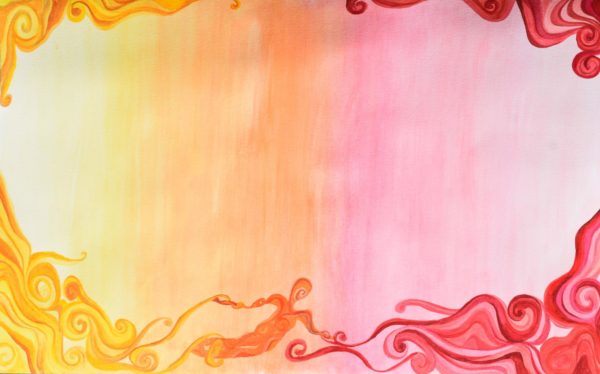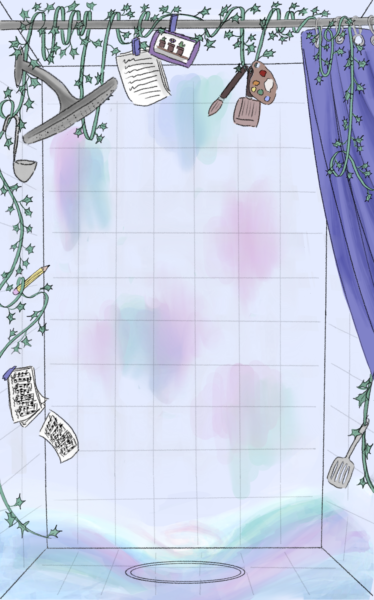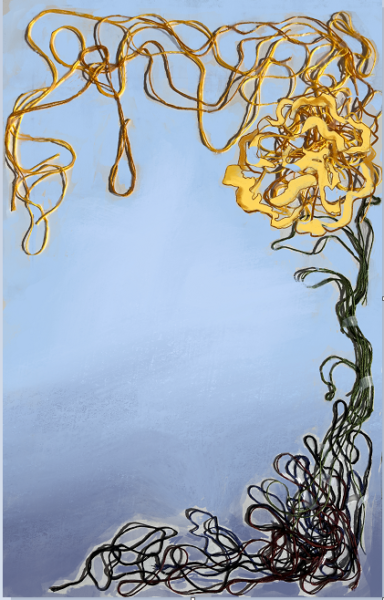As the Sun Sets: Painting Our Own Ending
June 9, 2020
With end-of-year plans gone awry due to COVID-19, Class of 2020 finds closure by painting own endings
The slight curve of the hallways. The feeling of racing back to third period from an off-campus lunch date. The way students and staff we only see at school greet us in the hall.
These are among the many pieces of Westview that Jade Treese (12), like many of the Class of 2020, said she’ll miss.
And while they might seem small, Treese said it’s the values they hold—familiarity, frustration, friendliness—that amount to what was lost.
“High school has been a place for me to meet everybody and interact and bond over small things,” Treese said. “It’s the commonality of being at Westview and taking AP’s or playing a sport and being nervous for your race, or planning an ASB event and being super stressed about it. There’s always someone I can find something in common with and my biggest joy in high school has been trying to connect with everyone in that way.”
But for Treese and the rest of the class of 2020, these connections were severed as they left school on March 13, not knowing that would be their last school day on campus.
Then, as screenshots of articles and recordings of Governor Newsom swept social media March 17, the prospect of an extended period indoors and an unexpected end to the Class of 2020’s senior year became increasingly possible.
Hannah Icban (12) said this news, though just a prediction by Newsom, was heartbreaking.
“For the longest time, I was in denial,” she said. “I just kept hoping we’d go back to school, or that things were going to get better quickly. I was tired of school, but graduation, Prom, all of the other activities—they kept me going.”
According to Dr. Dana S. Dunn, department chair and professor of social psychology at Moravian College in Bethlehem, Pennsylvania, the emotional reaction among the senior class results largely from a social clock that’s long been drilled into us.
“Americans [especially] like to lead their lives on what we might call a ‘social clock’—we graduate at age 18 and then go to college or into the workforce, marry and have children, pursue a career, et cetera,” Dunn said. “We see these stages as relatively fixed because so many people want and expect to experience them.”
Dunn said this common life structure is socially regarded as “normal,” which makes a non-traditional end to senior year more difficult to grapple with.
Both Icban and Treese said they saw an overwhelming amount of heartbreak among the senior class. Then, as the months began to thin and the feeling of time was lost, the rest of the school year was then confirmed to be lost with it.
Like Icban, Treese found herself dwelling over the milestones of senior year that would be missed.
“I was so excited for Disneyland, Prom and especially graduation because they gave me a sense of accomplishment, thinking I had worked so hard and finally got to enjoy the perks of being a senior,” she said. “I feel like it provides you with a sense of closure to celebrate as a group, one last time before everything changes.”
Dunn said that this anticipation of the end of high school is naturally created by the events that come with it, making it a kind of rite of passage.
“Most high school students know that high school ends at the end of their senior year, a year designed with key events to mark the passage of time and the passage into young adulthood,” she said. “Not having the chance to engage in the usual events—like Prom, for example—might leave some feeling that they did not have an authentic senior experience.”
Yet at some point, Treese was no longer lamenting over the lost milestones, but caught in a desire to return to routine, to see those she cared about every day, or at least, one last time.
“I think that more than anything, I remember on that Monday when we first started [online learning], I was ready to go to homeroom and talk to people, laugh with people, but it wasn’t there,” she said. “All the schoolwork was there, but the social aspects weren’t anymore.”
Like Treese, Icban missed the overlooked aspects of Westview. She also found herself regretting the time she took for granted. She wished to go back and thank her friends, her teachers, anyone who made an impact on her—but wasn’t able to.
“If it wasn’t for some of my friends and teachers, I wouldn’t have been graduating,” she said. “At points, I had even considered stopping with school, but my teachers helped me open up my options. I just wanted to say thank you to everybody, or just spend more time with people.”
According to Dunn, high school marks an important time in the adolescent’s life for emotional development, especially because of its high social engagement.
“High school provides community activities that create ties and bind like athletics and team sports, clubs, activities like band and orchestra, theater,” Dunn said. “All of these allow students to form meaningful friendships and memories with one another.”
While the promise of the end-of-the-year events kept Icban pushing in the long term, it was the meaningful, daily connections with friends and teachers that she began to miss the most.
“It really developed into a support system for me, so when I felt down, I was able to be with people who made me feel supported at school,” Icban said.
Though she missed the good friends she had made, Icban also saw high school as a journey, with its ups and downs getting her to this point.
“It was just a test through all the friends I was with, having to deal with people and toxic friendships,” Icban said. “I ultimately found what I want, and didn’t want anyone holding me back from the person I was becoming.”
Dunn said that both these positive and negative aspects of high school contribute to the person we become.
“High school likely presents more complex factors that affect identity development, such as peer pressure, conformity pressures, and a desire to fit in with cliques,” Dunn said. “It’s a critical period because students are trying to figure out who they are and who they want to become.”
In this journey, Icban said she felt she had finally reached a destination when she arrived at senior year.
“Starting even freshman year, I was getting excited seeing all these senior pranks and activities and graduation,” Icban said. “I was building up all this hard work just to walk across the stage and graduate for my family.”
Icban said that her work in applying to colleges only heightened her desire to reach this conclusion by her second term of senior year.
“I had felt like with all this college work I had done—applying, all the stress, the essays—it was all supposed to build up to this moment,” she said. “I could finally feel relieved and know that this all meant something in the end.”
But for Icban, Treese and the rest of the Class of 2020, this anticipation led to nothing but an unanticipated ending—a question of how to gain closure without being able to see those who helped them through their four years at Westview.
“You don’t get that last hug with someone, or that last laugh, or not even the last ‘congrats,’” Treese said. “We’re celebrating each other, but we’re celebrating so far, it’s like you’re distancing yourself from people. We’re not getting that final goodbye and send-off in the same way.”
According to Dunn, while these reactions to change in a pivotal time are reasonable, we can reshape our attitude towards the unexpected end.
“Human beings make and see meaning in the events they experience, especially those that are powerful,” she said. “The loss of routine is disruptive, but then we form new routines. As for closure, it is nice to have a communal celebration to mark the end, but an alternative end might carry the same weight.”
As tears eventually dried and disbelief faded, Treese said a change occurred in the Westview community. Once the reality of a fragmented ending to senior year had settled in, the conversation of repairing and reshaping it began.
“I saw parents really step up, especially when it came to not just celebrating their senior but all seniors,” Treese said. “I also saw students becoming involved in any way they can, especially when it comes to not-so-known traditions like the senior crush list or pranks. Everyone involved has really tried to make the best of it.”
Parents created a Facebook page to stay up to date on the status of events, and to create and organize new ones. They created and sold 299 custom senior lawn signs, according to the Westview Grad Nite Committee.
And while the parents worked on their end, the students did what they could to salvage their senior year. They created a senior crush list account to give the Class of 2020 something to reconnect over. Students like Austin Gauerke (12) even organized small, socially distanced make-up Proms.
“It was an absolute blast and we had total control over the music, activities and food,” Gauerke said. “I think it definitely helped replace [the experience]. I just missed out on my friends being a part of it as well.”
As with Gauerke’s make-up Prom, Treese recognized that through all these events, the core element of senior year was still missing: sharing the experience with peers.
“[The senior class presidents] have been trying to find a way to where we can all still stay connected, but at the same time, not push things so hard to where we’re trying to make up for the loss,” Treese said. “Because you just can’t make up for it.”
Treese and her co-class president Grace Morrison (12) created the “Westview 2020 Future Plans” Instagram account to celebrate senior plans as well.
“I don’t think there’s anything that can make up for senior Prom or graduation, or the senior Disneyland trip, but it shifts the focus,” Treese said. “Instead of focusing on what we’ve lost, we’re trying to shift the focus to what we’re going to have and what fun we’re going to have in the future experiences that we’re all looking forward to.”
Icban found herself shifting the focus on a personal level. She began investing more time in making plans at California State University, Long Beach by meeting future roommates and friends through social media.
But well into doing so, Icban said she felt her efforts had lost their meaning when it was announced that all CSU schools were to stay online in the fall.
“I had finally accepted that high school was not going to end the way I expected, but I had college to look forward to,” she said. “I switched my high school destination from senior year to college, but now it feels like my destination is up in the air.”
Icban said that it’s ultimately the uncertainty of the future that she has begun to fear the most.
“At this point, I’ve just realized that I can’t have expectations anymore with the virus because we really don’t know what’s going to happen in the future, and that hurts a lot,” Icban said. “The uncertainty of literally everything hurts a lot.”
While it is difficult, this natural fear of the future unknown can also be mentally reframed, according to Dunn.
“[The uncertainty of the future] can also be exciting if we frame it that way and look forward to the unknown with a sense of anticipation and adventure,” she said. “If you look forward with dread and anxiety, then you won’t welcome the passage of time or the transition into summer and college.”
Lost without an ending to look forward to, Icban, like many others, began crafting her own. While she can’t enjoy graduation in the vicinity of her friends and won’t be going to school in person in the fall, she’s taken this as an opportunity to celebrate and spend more time with her family.
“We have that little yard sign out front and it’s not much but it’s something,” Icban said. “This is more time, more opportunity to be with my family and even with some friends who are staying with us. Anything counts, at this point.”
Dunn said that while make-up events are giving in nature, students will likely feel more closure by thinking of it as recreating an ending. This shifts the focus from making up for what was lost to simply embracing a new ending.
However, rewriting an ending is difficult because of our desire to adhere to the social clock and stick to familiar tradition.
“What we don’t realize is that we can reset our social clock so that it is different from other people’s clocks,” she said. “Following a predictable pattern provides some comfort, but don’t forget Robert Frost’s advice about taking the less trod path, or making a new one.”
Though Treese said there is talk of postponing the senior year milestones to later in the summer, she expects these replacement events to disrupt the process of moving on from high school.
“As much as I’d love to get all dressed up with my friends for a summer Prom, I think that also kind of distracts from being able to move on,” she said. “The summer gets you ready to go and able to move on, but all of these things distract from the norm, and we’re tired of being distracted from it. Normalcy is what we want more than anything right now.”
Once the sun sets on our year, Dunn said the Class of 2020 will look at the colors of their sunset with admiration. It might be different than expected, but it’s a sunset nonetheless.
“In the long run, when COVID-19 and Spring 2020 are but memories, those seniors whose journey was disrupted will see their experience as a challenge they lived through and rose to meet,” Dunn said. “It may just end up being more interesting than the usual Prom narratives.”


